Introduction: Why Understanding DHT Matters
Hair loss affects millions globally, with one major culprit being a hormone called DHT (dihydrotestosterone). While essential for male development, excess DHT can bind to receptors in hair follicles, causing them to shrink over time in a process known as “miniaturization.” This leads to thinning hair, receding hairlines, and eventually baldness. Both men and women can be affected.
At AK Clinics, we believe that preventing hair loss should start with awareness and natural intervention. One of the safest ways to reduce DHT levels is through dietary and lifestyle changes.
What is DHT?
DHT is a derivative of testosterone, converted by the enzyme 5-alpha-reductase. When DHT binds to androgen receptors in the scalp, it causes hair follicles to shrink, weakening hair over time. Reducing DHT levels or blocking its binding to follicles can prevent hair loss and promote regrowth.
Common signs of DHT-related hair loss:
- Receding hairline (especially at temples)
- Thinning at the crown
- Overall reduced hair density

What converts testosterone to dihydrotestosterone (DHT)?
The androgen hormone which is secreted in the body is testosterone but in order to be carried out to tissue such as that in the brain or the skin, hormone testosterone bonds with the enzyme 5-alpha reductase to produce dihydrotestosterone. DHT can be influenced by the both external and internal factors which contributes to the increase in the hormonal levels in the body. For example, some say that stress causes hair loss but indirectly. Stress causes the release of cortisol hormone in bulk which further increases the adrenaline testosterone and dihydrotestosterone.Men with an enlarged prostate will also have increased DHT levels and there’s even a theory that the mechanism behind male pattern baldness is the body’s way to protect men from prostate cancer.
How DHT Causes Hair Loss
DHT plays a central role in hair thinning and pattern baldness. It binds to androgen receptors on hair follicles, especially in the scalp’s front and crown regions. Once bound, it alters the natural hair growth cycle, shortening the anagen (growth) phase and lengthening the telogen (resting) phase. Over time, hair follicles shrink—a process called miniaturization—leading to finer, shorter hairs until they eventually stop growing.
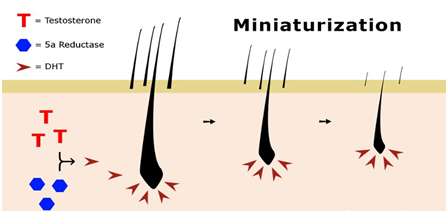
In men, this often results in male pattern baldness (MPB) with hair loss starting at the temples and crown. In women, DHT-related hair loss usually presents as diffuse thinning.
Does DHT Affect Transplanted Hair?
One of the most common questions we get at AK Clinics is whether DHT can affect hair transplanted from the donor area. The answer is reassuring: no. Transplanted follicles are harvested from the “permanent zone”—typically the back or sides of the scalp —which are genetically resistant to DHT. This means that, once transplanted, these hairs retain their DHT resistance even when moved to the balding area.
However, your existing native hair (the non-transplanted ones) may still be affected by DHT. That’s why we often recommend DHT-blocking foods, medications, or treatments like PRP therapy to protect surrounding hair and maintain a fuller look.
How to Naturally Block DHT
DHT-related hair loss affects both men and women, but it often presents differently. In women, excess DHT can lead to overall thinning, a widening part line, a smaller or thinner ponytail, and sometimes increased hair shedding. Fortunately, there are natural ways to manage this.
Below are some of the most effective foods that can help lower DHT levels and support healthier, fuller hair.
12 Best Natural Foods That Help Block DHT
DHT hair loss in women is different from DHT hair loss in men and it results in the overall thinning of the hair, widening center or side part, thinner pony tail etc. Here are the list few foods that act as best dht blocker food:
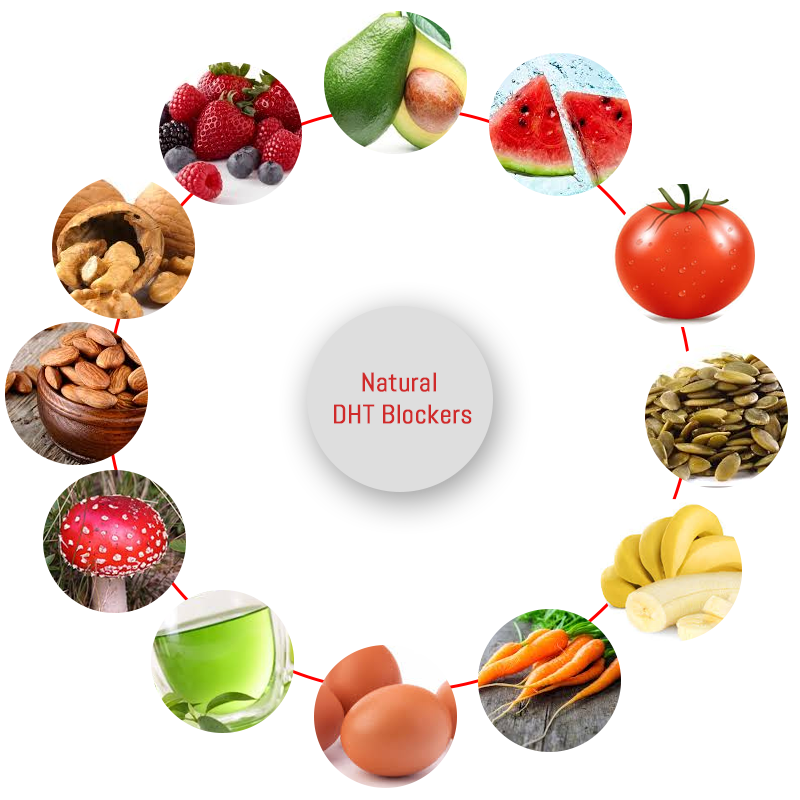
1) Berries:
- Especially blueberries, are rich in vitamin C and proanthocyanidins
- Improve scalp circulation and reduce oxidative stress
- Help shift follicles from the resting to the growth phase – Especially blueberries, are high in vitamin C and antioxidants like proanthocyanidins that improve circulation and help shift follicles from the resting to growing phase.
So go for the sweeter way to support your hair and make them strong & beautiful.
2) Avocado: Avocados are one of the biggest natural DHT blockers.
- High in vitamin E, monounsaturated fats, and phytosterols
- Promote scalp hydration and reduce oxidative damage
- May assist in flushing out excess DHT
Bring shine & luster to your hair by mashing Avocado to your palette…
3) Almonds: Crunchy nuts are full of protein and are brilliant source of biotin. Almonds are also known as “Hair vitamin”.
- Provide biotin (vitamin B7), vitamin E, and healthy fats
- Strengthen hair structure and support keratin formation
- Zinc in almonds helps in mild DHT suppression
So just eat a handful of soaked almonds in the morning and be beautiful with long, shiny & healthy hair.
4) Tomato: Lycopene in tomato inhibits the DHT by regulating or inhibiting 5 alpha reductase.
- Antioxidants in tomatoes help to fight cells causing damage the hair follicles and causes hair fall.
- Beta-carotene helps to supply nutrients to the scalp for hair growth.
Tomatoes can be easily included into diet in form of salads, sauce, and pastes or added to any your favorite dish.
5) Eggs: Eggs are rich in Biotin.
- Contain biotin and cysteine, important for hair protein (keratin)
- Promote follicle health and thickness
- Cooked eggs offer higher nutrient absorption than raw ones
Just like boiled egg having bounce, add volume & bounce to your hair easily by eating eggs daily!!
6) Pumpkin Seeds: Little munchkin pumpkin seeds contain number of essential minerals, including zinc, magnesium, iron etc.
- Rich in zinc, magnesium, and cucurbitin (an amino acid)
- Zinc helps regulate DHT production
- Promotes healthy follicle function and scalp nourishment
A handful of tiny pumpkin seed is enough for you at anytime. You can toss them into your favorite salad too!!!
7) Walnuts: Walnuts contain L-lysine which is a natural DHT inhibitor.
- Walnuts are high in protein.
- Best source of vitamin E (gamma tocopherol), promotes hair growth.
- Contains rare anti-inflammatory nutrients such as Tannins which combat hair loss.
You can incorporate more walnuts to your diet. Consuming direct nuts can be the best way. But if you don’t like the rancid smell of nuts, you can make salad with your own favorite fruits.
8) Banana: They are also rich in Biotin, which prevents the conversion of testosterone to DHT.
- Bananas are good source of potassium which help to maintain the circulatory system to work properly so that there will be adequate nutrient supply to the hair follicles.
- Bananas also contain FOS (fructo-oligosaccharides) that help to maintain the healthy gut bacteria (R). Healthy gut will reduce the overproduction of DHT.
Make your hair soft and silky by snipping banana daily…
9) White Mushroom:
- White mushrooms are also abundant in zinc, which blocks DHT production in the body.
- It also contains high sources of vitamin D and pantothenic acid, all vital for growing thick hair on the scalp.
Your hair must grow like a tree long, thick & mushrooms can help you in this…so eat as much as you can!!!
10) Carrots: Regularly use of carrot can make your hair lustrous, silky & smooth.
- Loaded with beta-carotene, which converts to vitamin A
- Promotes sebum production, keeping the scalp moisturized
- Helps protect against environmental damage
You can munch carrots a day or slurp carrot juice daily for beautiful long and healthy hair.
11) Green Tea:
- Contains EGCG (epigallocatechin gallate), a powerful antioxidant
- Inhibits 5-alpha-reductase, the enzyme responsible for converting testosterone into DHT
- Reduces inflammation on the scalp
- Improves blood flow to hair follicles
So sip a little cup of green tea daily to make your hair long & healthy…
12) Watermelon:
- A hydrating fruit rich in lycopene and citrulline, which helps to fight with DHT by inhibiting 5-alpha-reductase
- Watermelon is a rich source of vitamin C, B12 & B6.
- They help in hair growth & citrulline helps to eliminate the excess DHT from the body.
You are one in “MELON” (million), so don’t let the charm fade away,,, Eat watermelon all the day!!!
Lifestyle Changes to Naturally Lower DHT
Making the right lifestyle adjustments can support hormonal balance and lower the production of
dihydrotestosterone (DHT). Since DHT is synthesized from testosterone by the enzyme 5-alpha-reductase,
regulating its expression through healthy habits can play a key role in managing hair loss.
- Regular Exercise: Engaging in moderate-intensity aerobic and resistance exercises
can help regulate hormone levels and reduce body fat, a major contributor to increased DHT.
Studies show overweight individuals often have higher circulating androgens.
- Stress Reduction: Chronic stress elevates cortisol, which in turn can trigger hormonal
imbalances including elevated DHT. Practices like yoga, mindfulness meditation, and deep breathing have
been shown to regulate cortisol and improve endocrine function.
- Sleep Hygiene: Inadequate or poor-quality sleep can disrupt the balance of hormones,
including those responsible for hair growth. Aim for 7–9 hours of restful sleep to support testosterone
metabolism and reduce 5-alpha-reductase activity.
Together, these habits help lower DHT levels naturally while enhancing overall well-being. Deep sleep regulates hormonal cycles, including DHT production.
Natural Oils & Supplements for Blocking DHT
Top Oils
- Saw Palmetto Oil: Blocks DHT at the follicular level
- Coconut Oil: Moisturizes scalp, reduces inflammation
- Rosemary Oil: Promotes blood flow and DHT control
Effective Supplements
- Biotin (B7): Boosts keratin and hair strength
- Zinc: Reduces DHT formation
- Pumpkin Seed Oil Capsules
- Saw Palmetto Extract
- L-Lysine: Amino acid shown to reduce hair shedding
Foods to Avoid That May Increase DHT
Certain foods can increase androgen activity or trigger inflammatory responses that elevate the production of
dihydrotestosterone (DHT). Avoiding or limiting the following can help manage hair loss caused by hormonal imbalance:
- Refined Carbohydrates: White bread, sugary cereals, and pastries can spike insulin levels,
indirectly raising androgens and promoting the conversion of testosterone to DHT.
- Sugary Snacks and Beverages: Excess sugar elevates insulin and IGF-1 (insulin-like growth factor),
both of which are associated with increased sebum production and DHT activity in the scalp.
- Unhealthy Fats: Foods rich in trans fats and omega-6 fatty acids (like fried and processed snacks)
can promote inflammation and may increase the expression of 5-alpha-reductase.
- Excessive Dairy and Red Meat: These may contain added hormones or saturated fats that can interfere
with natural hormone balance, contributing to elevated DHT levels.
Choosing whole foods with a low glycemic index and anti-inflammatory properties helps maintain hormonal
equilibrium and promotes healthier hair growth.
Expert Insights from AK Clinics
“For many patients, adding natural DHT blockers while also undergoing PRP or Bio-FUE hair transplant yields much better results than treatment alone.” – Dr. Aman Dua
We recommend combining nutritional strategies with medical treatments tailored to your scalp condition for optimal hair regrowth.
Blocking DHT naturally is a proactive step toward preventing hair loss and supporting long-term follicular health.
With the right diet, lifestyle, and support from hair experts, hair loss can often be slowed or even reversed.
Here are few frequently asked questions by our patients about Natural DHT blockers
DHT (dihydrotestosterone) is a hormone derived from testosterone. It binds to hair follicle receptors, shrinking them over time and disrupting the natural hair growth cycle. This leads to thinning and eventual hair loss.
Yes. Nutrients like zinc, lycopene, EGCG, and curcumin—found in foods like green tea, pumpkin seeds, tomatoes, and turmeric—can inhibit 5-alpha-reductase, the enzyme that converts testosterone into DHT.
Most natural DHT blockers from food sources are safe when consumed in moderation. However, supplements should be taken under medical guidance, especially for individuals with underlying health conditions.
Yes. While hair loss patterns differ by gender, both men and women can experience DHT-related hair thinning. Natural blockers support hormonal balance for both.
A DHT-blocking diet can slow progression and support regrowth, but severe cases often need medical treatments like PRP, minoxidil, or hair transplant for optimal results.
You may notice improvements in 8–12 weeks of consistent dietary changes, especially when paired with a healthy lifestyle and proper hair care.
Yes. Combining food-based DHT blockers with supplements like saw palmetto or zinc may enhance effectiveness—but consult a doctor first.
No. Transplanted hair is typically taken from DHT-resistant donor zones and remains unaffected. However, surrounding native hair may still be at risk if DHT isn’t controlled.
Avoid high-sugar snacks, refined carbs, processed meats, and dairy with added hormones—all of which can increase androgen activity and contribute to hair loss.
Yes. This guide complements treatments like PRP, minoxidil, or transplant surgery, offering dietary and lifestyle support to optimize long-term results.









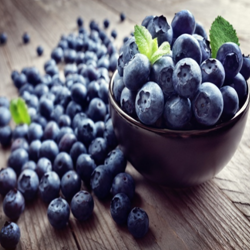
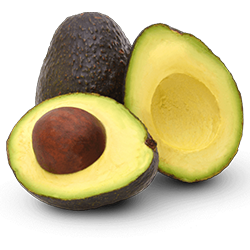
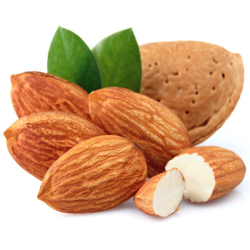


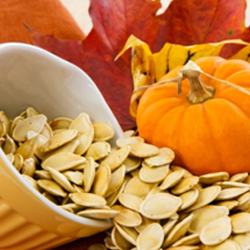
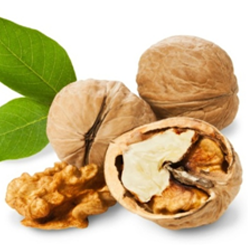
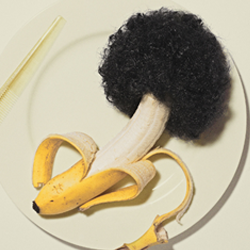
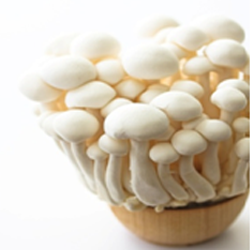


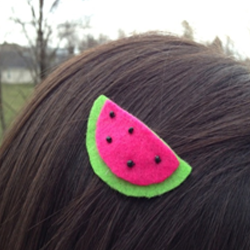


Leave a Comment